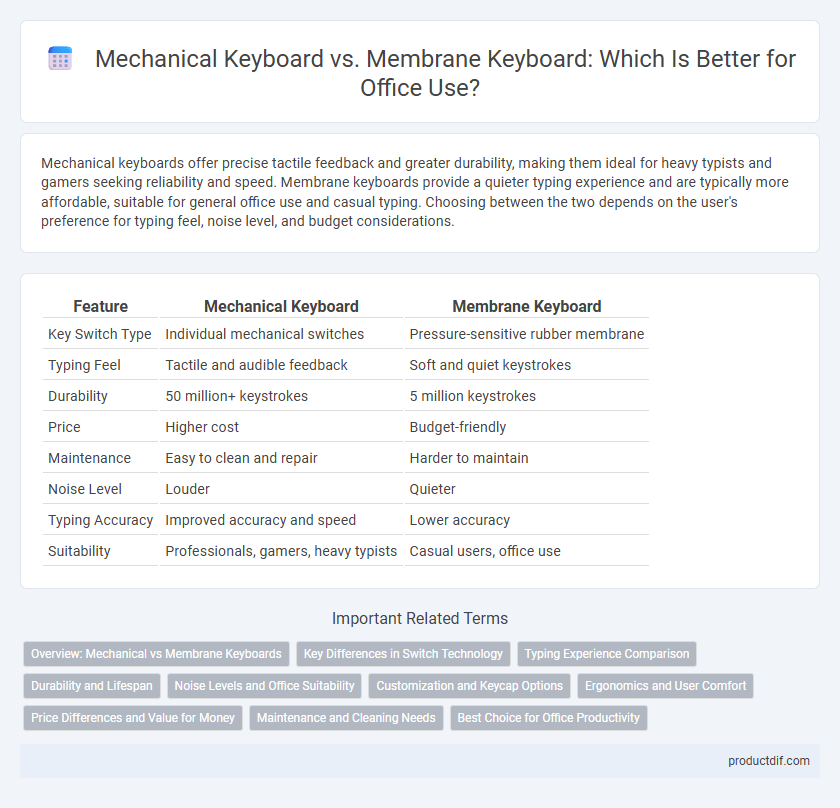Mechanical keyboards offer precise tactile feedback and greater durability, making them ideal for heavy typists and gamers seeking reliability and speed. Membrane keyboards provide a quieter typing experience and are typically more affordable, suitable for general office use and casual typing. Choosing between the two depends on the user's preference for typing feel, noise level, and budget considerations.
Table of Comparison
| Feature | Mechanical Keyboard | Membrane Keyboard |
|---|---|---|
| Key Switch Type | Individual mechanical switches | Pressure-sensitive rubber membrane |
| Typing Feel | Tactile and audible feedback | Soft and quiet keystrokes |
| Durability | 50 million+ keystrokes | 5 million keystrokes |
| Price | Higher cost | Budget-friendly |
| Maintenance | Easy to clean and repair | Harder to maintain |
| Noise Level | Louder | Quieter |
| Typing Accuracy | Improved accuracy and speed | Lower accuracy |
| Suitability | Professionals, gamers, heavy typists | Casual users, office use |
Overview: Mechanical vs Membrane Keyboards
Mechanical keyboards feature individual mechanical switches beneath each key, offering tactile feedback, durability, and precise key actuation, making them ideal for heavy typing tasks and gaming. Membrane keyboards use a pressure-sensitive rubber dome beneath the keys, resulting in quieter operation and lower cost but less tactile responsiveness and shorter lifespan. Choosing between the two depends on the user's preference for typing experience, noise level, and budget constraints.
Key Differences in Switch Technology
Mechanical keyboards use individual mechanical switches for each key, offering tactile feedback, durability of up to 50 million keystrokes, and precise actuation points, enhancing typing accuracy and responsiveness. In contrast, membrane keyboards rely on pressure pads with a rubber dome beneath each key, resulting in quieter operation but less tactile feedback and lower lifespan, typically around 5 million keystrokes. These differences in switch technology significantly impact the user experience, with mechanical switches favored for gaming and heavy typing, while membrane switches suit budget-conscious or quiet office environments.
Typing Experience Comparison
Mechanical keyboards provide a tactile and audible feedback that enhances typing accuracy and speed, making them ideal for prolonged office use. Membrane keyboards offer a quieter and softer keystroke, which can reduce finger fatigue but may sacrifice responsiveness and precision. Users seeking a more satisfying and efficient typing experience often prefer mechanical keyboards for their consistent key actuation and durability.
Durability and Lifespan
Mechanical keyboards offer superior durability with high-quality switches rated for up to 50 million keystrokes, making them ideal for heavy office use. Membrane keyboards generally have a shorter lifespan, typically lasting about 1 to 3 years, as their rubber dome mechanisms wear out faster. Investing in a mechanical keyboard ensures long-term reliability and consistent performance in busy office environments.
Noise Levels and Office Suitability
Mechanical keyboards produce distinct, audible clicks and higher noise levels, making them less ideal for quiet office environments. Membrane keyboards operate more quietly due to their soft rubber dome switches, enhancing concentration and minimizing distractions. Office settings prioritizing noise reduction and a calm workspace benefit more from membrane keyboards for daily use.
Customization and Keycap Options
Mechanical keyboards offer extensive customization options with a wide variety of switch types, keycap materials, and designs, allowing users to tailor tactile feedback and aesthetics to their preferences. Membrane keyboards typically have limited customization, featuring fixed key switches and fewer keycap replacement choices, which restricts personalization. Enthusiasts and professionals often prefer mechanical keyboards for the enhanced flexibility in keycap options and switch customization that improve typing experience and durability.
Ergonomics and User Comfort
Mechanical keyboards provide superior ergonomics and user comfort due to their tactile feedback and customizable key switches that reduce finger fatigue during prolonged typing sessions. Membrane keyboards often lack this tactile precision, resulting in less ergonomic support and potentially more strain on the fingers and wrists. For office environments prioritizing long hours of typing, mechanical keyboards enhance comfort and reduce the risk of repetitive strain injuries.
Price Differences and Value for Money
Mechanical keyboards typically have a higher upfront cost, often ranging from $70 to over $200, while membrane keyboards are more budget-friendly, usually priced between $20 and $50. The durable build and customizable features of mechanical keyboards offer better long-term value for office users who type extensively, reducing replacement frequency and improving typing comfort. Membrane keyboards provide an economical choice for occasional use but may require more frequent replacement due to less durable materials and lower tactile feedback.
Maintenance and Cleaning Needs
Mechanical keyboards require less frequent cleaning due to their individual key switches that resist dust and debris buildup, making maintenance easier compared to membrane keyboards. Membrane keyboards tend to accumulate dirt and grime underneath the rubber dome sheets, necessitating regular removal of keycaps and thorough cleaning. Proper maintenance of mechanical keyboards often involves just occasional keycap removal and dusting, while membrane keyboards demand more detailed cleaning to prevent key malfunctions.
Best Choice for Office Productivity
Mechanical keyboards offer superior tactile feedback and durability, enhancing typing accuracy and speed in office environments. Membrane keyboards provide quieter operation and lower cost but may sacrifice long-term comfort and responsiveness. For sustained office productivity, mechanical keyboards are generally the best choice due to their ergonomic benefits and reliability.
Mechanical keyboard vs Membrane keyboard Infographic

 productdif.com
productdif.com